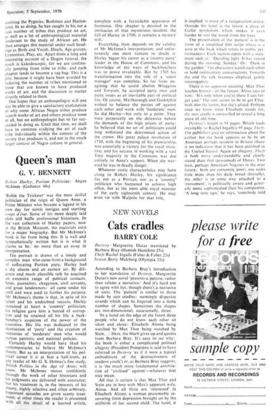Queen's man
G. V. BENNETT
Robert Harley, Puritan Politician: Angus McInnes (Gollancz 48s)
'Robin the Trickster' was the most skilful politician of the reign of Queen Anne, a Prime Minister who became a legend in his own day for subtle intrigue and startling coups d'etat. Some of his more deeply laid plots still baffle professional historians. In the vast collection of Harley papers, now in the British Museum, the materials exist for a major biography. But Mr McInnes's book is far from being this. It is well and sympathetically written but it is what it claims to be: no more than an essay in interpretation.
The portrait is drawn of a lonely and complex man who came from a background of suffocating Puritan piety. Harley had a shy charm and an earnest air. By dili- gence and much plausible talk he acquired an extensive range of political contacts. Spies, journalists, clergymen, civil servants, and great landowners: all came under his spell and were used to further his purpose. Mr McInnes's theme is that, in spite of his talent and his undoubted success, Harley remained at heart a 'country' politician; his religion gave him a hatred of corrup- tion and he retained all his life a back- bencher's suspicion of the power of the executive. His life was dedicated to the destruction of 'party' and the creation of ministries of 'moderate' men who would pursue patriotic and national policies.
Certainly Harley would have liked his contemporaries to believe Mr McInnes's theory. But as an interpretation of his pol- itical career it is at best a half-truth, as any reader of Mr G. S. Holmes's fine study, British Politics in the Age of Anne, will know. Mr McInnes moves confidently through the work of other historians and his Judgments are delivered with assurance; but his treatment is, in the interests of his theory, highly selective and often arbitrary. important episodes are given scanty treat- ment; at other times the reader is presented With all the detail of a learned article,- complete with a formidable apparatus of footnotes. One chapter is devoted to the intricacies of that mysterious. incident, the fall of Harley in 1708; it remains a mystery still.
Everything, then, depends on the validity of Mr McInnes's interpretation; and unfor- tunately one must venture to doubt it. Harley began his career as a 'country party' leader in the House of Commons, and his knowledge of the ways of backbenchers was to prove invaluable. But by 1705 his transformation into the role of a 'court manager' was complete. So far from im- agining that he could abolish Whiggism and Toryism, he accepted party men and party issues as an inevitable part of political life. Of course, Marlborough and Godolphin wished to balance the parties off against each other and work with 'moderate' men. So did Harley—but only to a point. They were perpetually on the defensive before the demands of the high priests of party; he believed that no set of politicians could long withstand the determined action of the crown. His great palace revolution of 1710, with the beginning of his premiership, was essentially a victory for the royal initia- tive; and his success in working with a vast Tory majority in the Commons was due entirely to Anne's support. When she wav- ered he was in deadly danger.
Whatever rustic characteristics may have clung to Robert Harley, his significance lies not as a Puritan, nor as a 'country' politician who happened to achieve high office, but as the most able royal minister of the early eighteenth century. He may even vie with Walpole for that title,






























 Previous page
Previous page